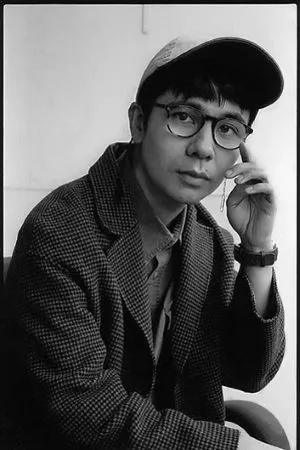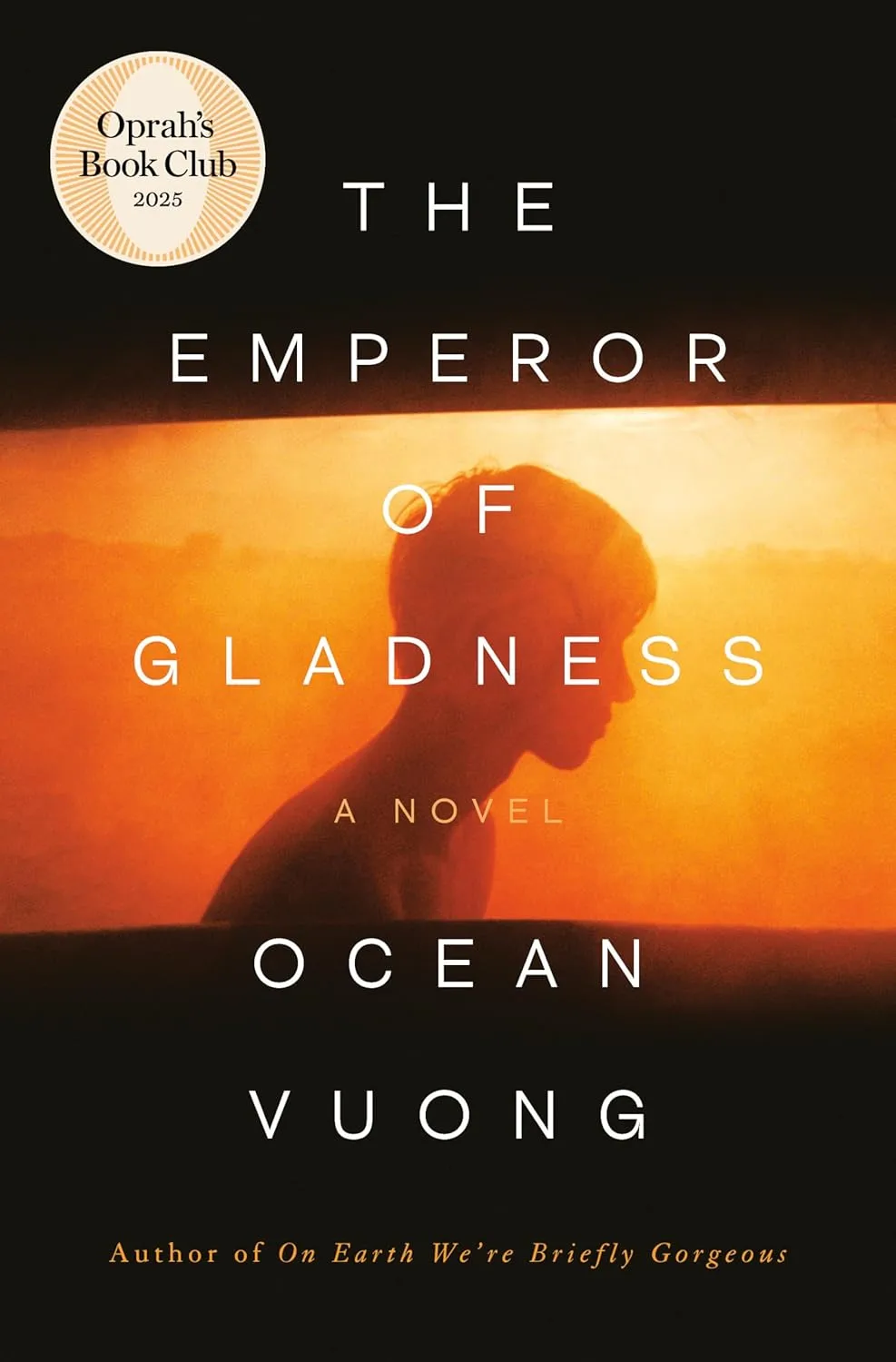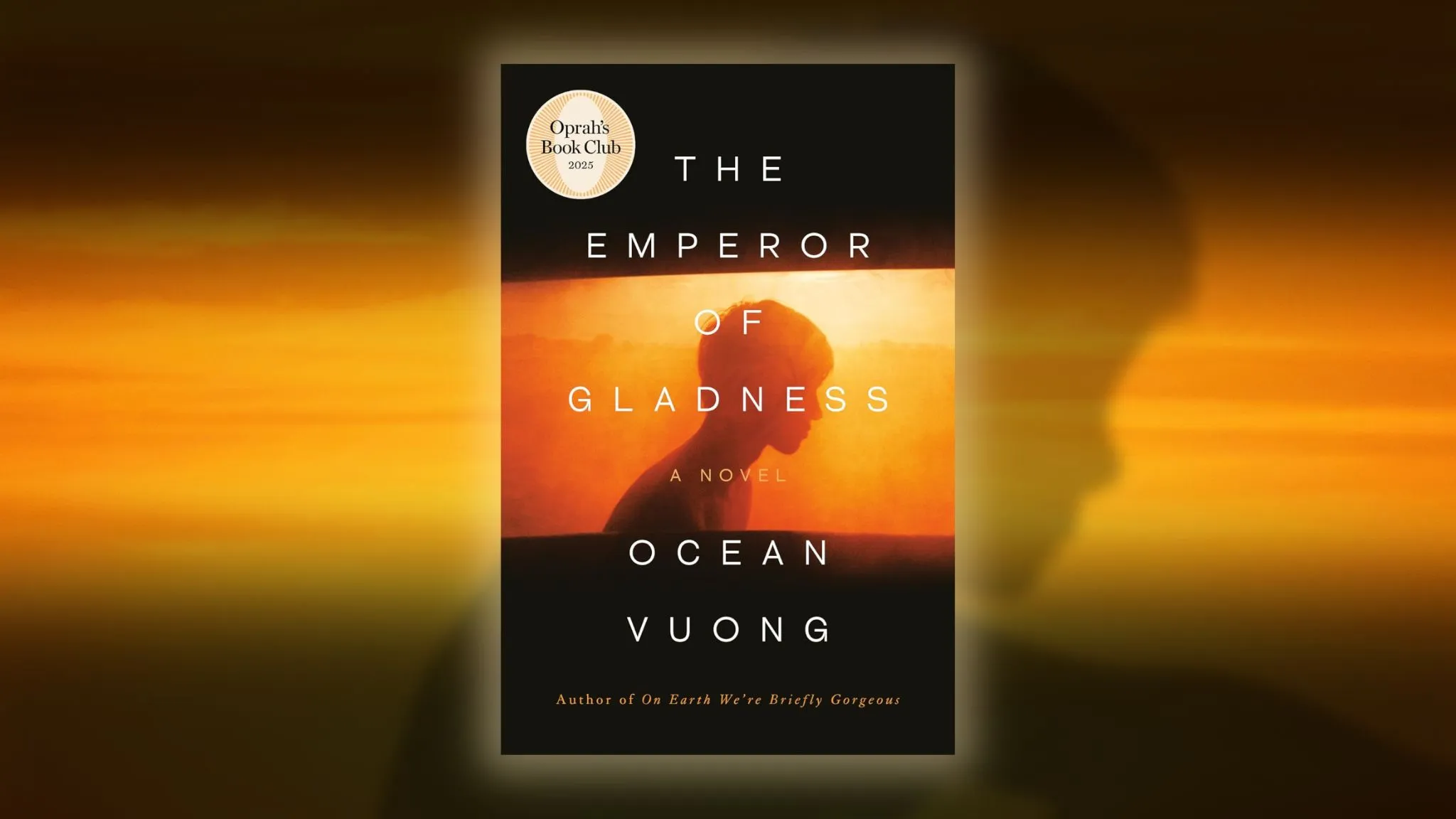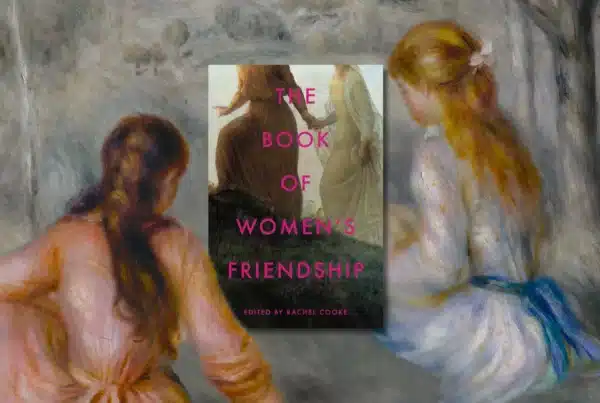The Emperor of Gladness by Ocean Vuong
An adolescent, sometimes-addict, sometimes-liar by the name of Hai grapples with the weight of what life is and what it should be in small town East Gladness, Connecticut, in Ocean Vuong’s latest novel: The Emperor of Gladness.
Vuong’s sophomore novel is a nod to the lives and experiences the writer accumulated before his well-deserved and overwhelming success in the poetry landscape. In fashion with Vuong’s poems, the novel’s prose strikes an impossible balance between tender and powerful. This book will make you cry, but it will at least hold your hand while you do.
Lies Can Be Better than Truth
The book opens with an introduction to the town of East Gladness and its past history. It is a town we all know, a town we have all passed through, only to stop in on a journey to a greater destination. The post-industrial town has lost its purpose over time and slowly succumbed to a commercialized entombment — farms turned into strip malls, babbling brooks into the gutters gurgling behind the Taco Bell. It may seem like the land itself is yearning for a purpose it no longer serves, like it was promised one thing but given another.
This is where Hai grew up with his Vietnamese family. His mother runs a nail salon and has high hopes for her son’s future. She believes he is off in Boston, deep into a medical school degree with a future white coat on his back. Hai tells her anecdotes of his late nights at the library over the phone — only he is calling her from outside her own bedroom window in East Gladness.
Sometimes lies are better than truth. Sometimes the original purpose of things gets lost and confused along the way. Sometimes you might find yourself thinking “is this it?” on the side of a bridge, in the pouring rain, the seemingly only opportunity for a way out beckoning you in the middle of the night.
An Unexpected, Endearing Duo
Hai, about to get his desired escape from East Gladness, is interrupted by Grazina, an elderly Russian widow. Their chance connection in this moment gives each of them something they did not believe could happen: a second chance at life.
Hai and Grazina are the definition of an unlikely pair, but the bond they share becomes the only stability each can rely on. Hai, after dropping out of college and a one-time stint in rehab, wrestles with using pills to soften the harsh realities that seem to suffocate him. Grazina, succumbing to dementia after experiencing WW2 and being abandoned by uncaring children, is clinging to whatever hold on reality she can. Their relationship is guaranteed to soften the hearts of even the coldest reader.
Small Town Life and Work
Hai seeks out a job at the town’s HomeMarket, a food chain that provides Thanksgiving-esque dishes all year round. His neurodivergent and endearing cousin Sony works there, easing his transition into the workplace that is teeming with interesting characters.
These are individuals you have met before, coworkers who use conspiracy theories to cope or work endlessly to support family members relying on their ability to collect a check. They are all surviving, despite the odds against them.
Hai begins to call this sterilized, mechanical, commercial food bank home. Between the steel countertops and vats of golden cornbread, there is a profound sense of human persistence: that humanity will persevere through corporate cracks and shape relationships beyond the “what can I get for you today?” repeated ad nauseum.
Prose with a Pulse
Vuong expertly captures the conversations between rushes that build a breathing, beating heart at the center of food service. If you have worked in a service job, you will relive conversations in the alleyway with coworkers once known, feel the chill of the walk-in freezer at your back, and the sense of unity felt between individuals closest to you simply due to the amount of collective hours shared.
Hai and the HomeMarket crew quickly become one set of well-oiled limbs, and the kind of found family that accepts one another to a degree most unparalleled. It is there where a sense of belonging is born.
The American Story
This book is a collection of human history and human stories, told through the perspective of a boy who is othered by his identity, by his morality and by his sexuality. This book will not ask you to be kind or good. It might even suggest that this isn’t what life is about — as Grazina puts it, “to be alive, and try to be a decent person, and not turn it into anything big or grand, that’s the hardest thing of all.”
The Emperor of Gladness will remind us that being “American” is not one singular story. It is a convergence of many, many invisible ones. Vuong honors the silent, persistent presence of the heroes just getting by. There’s a sort of adolescent victimhood to circumstance, but such a purposeful joy in the resistance of it all. This quiet defiance bleeds through the pages.
A Stunning Novel with Heart
BookTrib is based in Westport, Connecticut, so it is a given as a reader to feel partial to the descriptions of a rural CT town. If you grew up there, not just passing through, but were rooted amongst the rock walls left behind by soldiers and oak trees older than most American states, you’ll appreciate the almost unintentional love and appreciation with which Vuong describes his home state.
There’s a way an old Connecticut town feels when you pass through it at night. Hollowed out, blasted yet stilled into a potent aftermath, all of it touched by an inexplicable beauty, like the outside has suddenly become one huge living room. And you feel you can sit down underneath the sincere light of a streetlamp and no one would bother you, no one would tell you to leave, because they know you’re staying for a reason.
If you love Ocean Vuong, stunning prose, have ever stood behind a POS for eight hours a day (or haven’t), grew up in a forgotten town, or have a human heart, you should read The Emperor of Gladness. You’ll be better for it.
About Ocean Vuong:
 Ocean Vuong is the author of the critically acclaimed poetry collections Night Sky with Exit Wounds and Time Is a Mother, as well as the New York Times bestselling novel On Earth We’re Briefly Gorgeous. A recipient of the American Book Award and the MacArthur “Genius Grant,” he has also worked as a line cook, tobacco harvester, nursing home volunteer and fast-food server, the latter becoming inspiration for The Emperor of Gladness. Born in Saigon, Vietnam, he currently splits his time between Northampton, Massachusetts, and New York City.
Ocean Vuong is the author of the critically acclaimed poetry collections Night Sky with Exit Wounds and Time Is a Mother, as well as the New York Times bestselling novel On Earth We’re Briefly Gorgeous. A recipient of the American Book Award and the MacArthur “Genius Grant,” he has also worked as a line cook, tobacco harvester, nursing home volunteer and fast-food server, the latter becoming inspiration for The Emperor of Gladness. Born in Saigon, Vietnam, he currently splits his time between Northampton, Massachusetts, and New York City.






